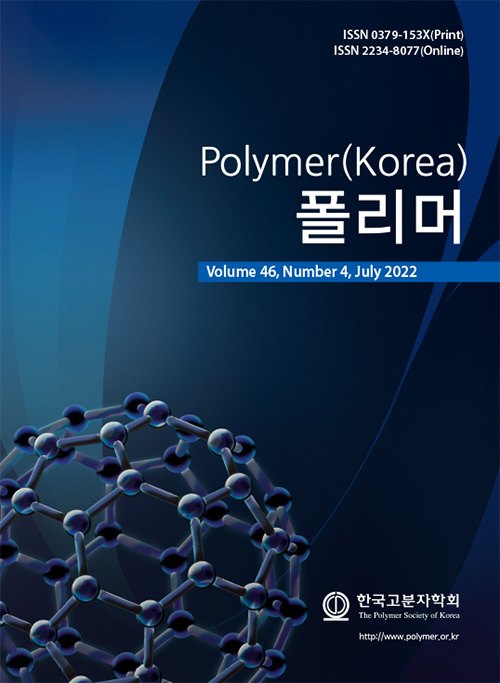- Synthesis of End-functionalized Acrylic Resins and Their Mechanical Properties
Department of Chemical and Biological Engineering, Korea University, Seoul 02841, Korea
*KCC Central Research Institute, Yongin-si, Gyeonggi-do 16891, Korea- 말단이 변성된 아크릴 수지의 합성 및 말단기와 분자량에 따른 기계적 물성 변화
고려대학교 화공생명공학과, *KCC 중앙연구소
Reproduction, stored in a retrieval system, or transmitted in any form of any part of this publication is permitted only by written permission from the Polymer Society of Korea.
In this work, acrylic resins consisting of difunctional poly (butyl acrylate) (PBA) were prepared via atom transfer radical polymerization. PBA acrylic resins with two different molecular weights were synthesized and the terminal groups of the bifunctional PBA were substituted with an acrylate group (A type), a silane group (S type), and a vinyl group (V type). The resulting PBA acrylic resins were characterized by gel permeation chromatography and nuclear magnetic resonance spectroscopy. These resins having different terminal groups were cured using thermal curing, UV curing, and moisture curing. The mechanical properties were examined using tensile and peel tests according to the molecular weight and the type of end groups.
본 연구에서는 atom transfer radical polymerization를 통해 이기능성 poly(butyl acrylate)(PBA)를 합성하였다. 아크릴 수지의 기계적 물성 변화를 확인하기 위해 두 가지 분자량의 PBA를 합성하고, PBA의 양 말단기를 아크릴기, 실란기, 비닐기로 치환하였다. 합성된 두 가지 분자량의 PBA와 치환된 양 말단기를 겔 투과 크로마토그래피와 핵자기공명 분광법을 통해 확인하였다. 이후 말단기가 치환된 세 가지 PBA를 열경화, 광경화, 습도경화를 통해 아크릴 수지를 합성하고 이에 대한 기계적 물성 변화를 인장 실험과 박리 실험을 통해 확인하였다. 인장 실험의 경우 분자량이 작을수록 경화 밀도가 증가하여 인장 강도가 증가하였고, 박리 실험은 말단기에 따른 경화 방식에 따라 박리 강도가 변화하였으며 이는 경화 정도의 차이인 것으로 추측된다. 이를 통해 실란트에 적용 가능한 아크릴 수지의 물성을 조절하여 산업적 활용 가능성을 확인하였다.
Keywords: acrylic resin, end-functionalization, crosslinking, tensile strength, peel strength.
- Polymer(Korea) 폴리머
- Frequency : Bimonthly(odd)
ISSN 0379-153X(Print)
ISSN 2234-8077(Online)
Abbr. Polym. Korea - 2023 Impact Factor : 0.4
- Indexed in SCIE
 This Article
This Article
-
2022; 46(4): 536-542
Published online Jul 25, 2022
- 10.7317/pk.2022.46.4.536
- Received on May 3, 2022
- Revised on May 22, 2022
- Accepted on May 23, 2022
 Correspondence to
Correspondence to
- Joona Bang
-
Department of Chemical and Biological Engineering, Korea University, Seoul 02841, Korea
- E-mail: joona@korea.ac.kr










 Copyright(c) The Polymer Society of Korea. All right reserved.
Copyright(c) The Polymer Society of Korea. All right reserved.